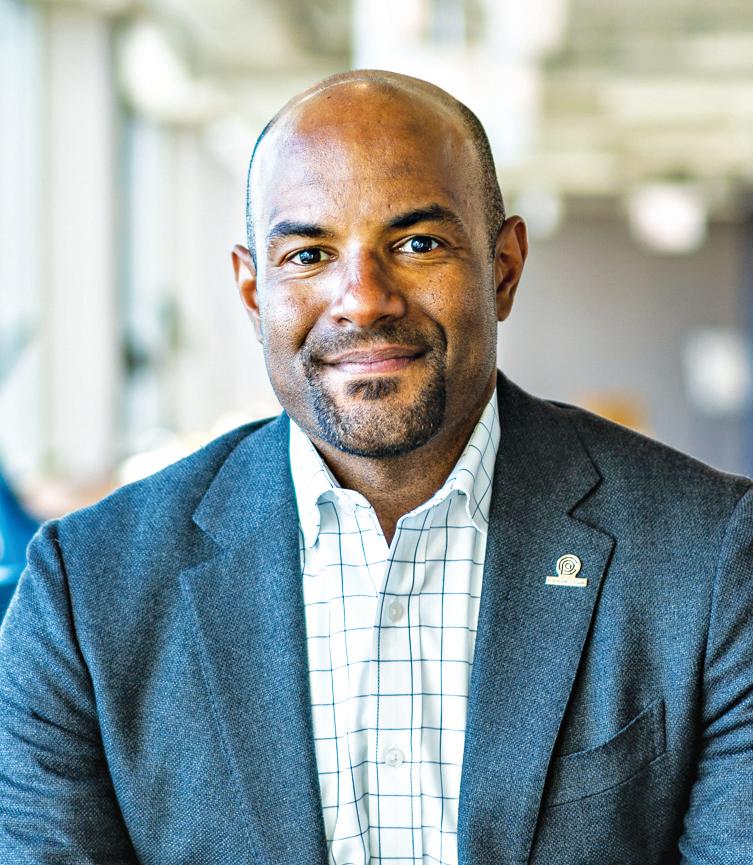Quick Six
Early careerists overestimate their readiness:
1 2 3 4 5 6
Across 37 skills among six distinct categories, early-career employees consistently rated their preparedness notably higher than managers did. On a 10-point scale, employees rated themselves 7.39 on average, while managers scored them at 4.95. That’s a wide and consistent gap in selfawareness versus manager expectations.
Communication and professionalism are misaligned:
Managers consistently rated early careerists lower in essential workplace behaviors, like adapting communication styles to fit the audiences, choosing the right channels, and demonstrating professionalism. On the other side, these employees believe they’re strong in these areas. This misalignment appears to hinder trust and create challenges in both team dynamics and client interactions.
Critical thinking and problem-solving skills fall short:
Managers rated early-career employees’ skills in these categories lowest. According to the survey findings, managers see these new professionals as unprepared to navigate ambiguity, apply sound judgment, make decisions without constant direction, and know when to ask for help. Managers also reported gaps in these employees’ abilities to think strategically, connect the dots across business functions, and draw insights from data.
Technological proficiency needs a reboot:
The closest alignment between early-career employees and managers is when it comes to rating their skills (or lack thereof) in the Technological Proficiency category. Unfortunately, both early careerists and managers rated these skills low in real-world practice, with employees indicating they’re the least prepared when it comes to utilizing data analysis and visualization tools and applying data analytics or artificial intelligence-driven tools in accounting processes.
Money doesn’t incentivize skills growth:
There’s a disconnect between what actually motivates early-career employees to build new skills or learn something new at work and what managers think motivates them to do so. Managers rated financial incentives (16%) as the leading motivator for newer employees. Instead, they indicated they’re primarily driven by a desire to feel more confident and capable in their roles (22%); financial incentives tied with working more efficiently or effectively (12%) as their thirdranked motivator.
Feedback is stuck in a loop:
Managers say they’re giving feedback, but earlycareer employees don’t seem to think it (or maybe don’t hear it). For instance, 59% of managers reported giving feedback on taking initiative or problem solving, but only 21% of employees reported receiving feedback on these skills. Similarly, 54% of managers reported giving feedback on written or verbal communication, but only 20% of employees reported receiving feedback in this area.
Research reveals early-career accounting and finance professionals are overestimating their competencies at a time when growing skills gaps are fueling generational friction.
By Derrick Lilly, Kari L. Natale, CAE, and Amy Sanchez
“It’s like they’re waiting for someone to spell out every step for them.”
“It feels like they don’t remember what it’s like to be new.”
Comments. Criticisms. Clashes. They’re nothing new. Anytime colleagues with differing skill levels, expectations, and perspectives come together, there’s a chance for conflict—but tension is on the rise. For the first time ever, five different and very distinct generations are trying to work together, giving way to the greatest amount of generational friction our workplaces have ever experienced.
We’ve all seen it. The baby boomers who’ve “paid their dues” and ascended to the top of the leadership ladder believe they’ve done (or do) everything “right.” The Gen Xers climbing the rungs just below them, well, they never seem to do anything quite as good— and have complementary complaints about their millennial reports. Millennials, now largely managing others, are critical of their Gen Z reports. And even Gen Zers—no longer the most inexperienced (but still in the early stages of their careers)—seemingly take issue with the youngest workers, Gen Alphas, who are now entering the professional workforce via early internships.
As it’s gone, generation after generation, from the top of the corporate ladder down, standing on each rung lower is a younger, greener talent pool that seemingly hasn’t lived up to their seniors’ expectations just yet. And, of course, the earlier someone is in their career, the more they question why those above them do everything the way they do—and the more likely they’re to think they can do it all better (at least that’s the perception). It’s a cycle we at the Illinois CPA Society (ICPAS) have seen play out repeatedly throughout our organization’s more than 120-year history of stewarding and supporting accounting and finance professionals along every stage of their career journeys.
Throughout that time, we’ve seen countless talent trends and challenges come and go, each altering the human capital landscape and shaping the profession’s future in some way. The problem we see with this cycle continuing unchecked is that the generational friction in firms and companies is coming to a head, exacerbated by other issues challenging the accounting and finance profession. Tolerance for skills gaps is being increasingly tested by the talent shortage. An ever-accelerating pace of change is giving real meaning to the cliché that the only constant is change. The now constant need to continually adapt to evolving regulations and client and customer demands is driving greater technology and artificial intelligence (AI)
adoption and shifts toward advisory services. These changes are simultaneously eliminating many of the low-level technical and compliance tasks early-career professionals once cut their teeth on.
The candid feedback we hear from our many members and insider connections implies that just about everyone is questioning to some degree whether those around them are prepared to do the jobs they were hired for, with the most scrutiny and criticism falling on, unsurprisingly, the most inexperienced.
It’s this growing workplace friction and the perceived widening of skills gaps that moved us to explore the expectations versus realities impacting early-career accounting and finance professionals and those who manage them.
Measuring the Divide
We know hiring and retaining talented early-career professionals is getting harder. Our past Insight Special Features, “Righting Retention,” and “Re-Decoding the Decline: An Updated CPA Pipeline Report,” both offer a wealth of insight into why and what to do about it, but the key to addressing the profession’s human capital needs is developing talent in a thoughtful and meaningful way. The fact is, many managers have raised their concerns to us about skills gaps, particularly among new hires. At the same time, these early-career professionals have expressed frustration with feeling undervalued and disillusionment from the lack of training and support they’re receiving from their managers and employers.
To better understand these disconnects and what could be done to mend them, we launched a research project in early 2025 to assess where early-career accounting and finance professionals stand, what’s working for them, what’s missing, and how they can be better prepared and supported to succeed in the profession. Three primary goals guided the research:
1. Assess readiness: Understand how prepared (or unprepared) early-career professionals feel—and how their managers perceive their readiness.
2. Uncover gaps: Identify notable disconnects between expectations and experiences, and pinpoint where additional support, training, or skill building is needed.
3. Inform action: Use insights to shape strategies, resources, and support systems that help early-career talent grow and succeed.
We kicked off our research in January by convening two distinct sets of professionals. First, we gathered insights from senior leaders across public accounting, corporate finance, and academia to understand their perspectives on talent needs and challenges. We then invited emerging leaders to weigh in with their personal experiences, reflecting on their engagements with their managers and their interactions when managing new recruits and other early careerists.
With all these insights in hand, we developed a survey aimed at both early careerists and those who manage them in collaboration with Joshua Herbold, Ph.D., CPA, teaching professor of accountancy and associate head in the Gies College of Business at the University of Illinois Urbana-Champaign, who’s also a member of the ICPAS Board of Directors.
The survey specifically aimed to measure how prepared early careerists felt in their first full-time roles, while managers were asked to rate how prepared their early-career employees were. The survey covered 37 skills divided among six distinct categories: Communication & Professionalism, Technical & Business Knowledge, Critical Thinking & Problem Solving, Adaptability & Initiative, Technological Proficiency, and Career Development & Resilience. The survey also measured perceptions around support for skills development, feedback, motivation to build new skills, and more related to workforce readiness.
The survey ran from April through May and was analyzed by our staff researchers and Herbold in June. The final data set includes 470 responses comprised of 185 early careerists with less than five years of experience in the accounting and finance profession, and 285 managers who supervise employees with less than five years of experience in the profession.
Respondents reflected a wide mix of demographics, with especially strong participation from professionals in public accounting. Of note, early-career respondents indicated they completed most of their accounting or finance education at 29 Illinois-based, 44 out-of-state, and eight international academic institutions, reflecting a diverse mix of educational experiences and preparation. Many (36%) had master’s degrees, while most (60%) had bachelor’s degrees. Further, the majority were or intended to become certified public accountants (CPAs): 27% were CPAs, 42% were in the process of becoming CPAs, 19% planned on becoming CPAs, while the remaining 12% weren’t currently in the CPA pipeline.
The responses received were consistent and exhibited clear themes. Measures were also taken to maintain accuracy and validity, such as removing responses that exhibited patterns of automation.
Describing the Disconnect
Accounting and finance professionals live and breathe data, but sometimes data doesn’t tell the whole story. That’s one reason why candid conversations with professionals who have firsthand experiences with skills gap challenges were integral to understanding the perceptions prevalent in the profession now.
Senior Leaders on Early Careerists
The profession is moving at such a rapid pace of change that even those leading the largest firms admit that keeping up is a challenge. The leaders we met with believe there are skills gaps at all levels— from intern to partner. This is largely due to the fact that today’s professionals are expected to be more than just accountants—they must also serve as trusted and strategic advisors, focusing on where their clients and their organizations are now and where they’re going.
Simultaneously, they must also keep a keen eye on where their own firms stand in the cycle of evolution throughout the profession. As one managing partner put it, if grit and resilience aren’t skills, “they need to be.”
Indeed, the consensus among the leaders we spoke with, along with the managers responding to our survey, is that the pace of change and the growing need to be adaptable, resilient, and able to learn on the move are driving widening skills gaps. These are qualities that are hard to teach in a classroom—and under day-to-day demands, managers often struggle to dedicate time or patience to developing them.
Compounding the issue is that “the exponential change driven by tech and AI will only continue to challenge the profession’s prior norms and skills expectations,” said one senior leader. This will only make it harder to anticipate future needs and underscores why stronger, better aligned communication and problem-solving skills must be prioritized.
Another meeting participant emphasized that more time than ever is being spent teaching new hires and early-career employees about what the expectations are of their roles and how to work with clients.
In fact, this group of leaders stressed that gaps in business-critical communication skills—like choosing the best communication method for the situation, speaking to colleagues and clients, delivering effective feedback, asking thoughtful questions, building trust, and generally just being responsive—need to close more quickly.
The bottom line: Managing partners and people leaders are looking for stronger communication, critical thinking, and problem-solving skills in their early careerists. For new hires, simply coming into the profession with the open-mindedness to learn and adapt to their new organizations’ approaches to all these things could go a long way in accelerating preparedness and exhibiting eagerness to be highperforming talent.
On the flip side, this group of leaders acknowledged that they too must communicate better. They pointed out that managers across all levels must deliver more effective feedback and have more frequent and candid conversations with early-career employees to identify skills gaps, clarify career goals, and better explain what career advancement requires in terms of skills.
All in all, these leaders agree that a more intentional approach to addressing challenges (both real and perceived) from all sides can help reduce generational friction and close critical gaps that inhibit talent development.
Emerging Leaders on Early Careerists
Within today’s companies and firms, being just five to 10 years into one’s career often places professionals in roles where they’re both managing new hires and still working under leaders who are critiquing them. Keeping this unique dynamic in mind, we asked emerging leaders to share their perspectives.
To no surprise, these emerging leaders are noticing areas where the early careerists they’re managing need more support. Much like the managing partners and other senior leaders we spoke with, the emerging leaders also pointed to foundational skills needed to thrive in accounting and finance—communication, critical thinking, problem solving, and project management—as areas that too often remain underdeveloped in today’s early-career employees.
As one emerging leader explained, “Even when we hire smart talent, it may not translate into professionalism,” noting challenges related to social skills, professional maturity, and workplace etiquette among early careerists.
Others highlighted how the modern workplace itself—relaxed dress codes, flexible work arrangements, and changing generational priorities and attitudes—has blurred the definition of professionalism. Traditionally tied to competence, reliability, integrity, respect, communication, and overall presence, professionalism can be hard for new employees to comprehend and then demonstrate consistently.
“It’s almost like they expect a checklist of what they need to do and learn,” another emerging leader stated.
Another emphasized gaps in critical thinking and problem-solving skills among new hires today. In fact, this emerging leader expects organizations to hire fewer interns for this very reason—they lack these skills, which aren’t only critical to working alongside AI but are also necessary for adapting to change and contributing new ideas. The problem? Fewer internships will likely lead to fewer opportunities for students to practice essential skills and gain confidence before entering the workforce.
Reflecting on this, many of these emerging leaders said there’s been a clear shift in expectations of new recruits since they first joined the profession. For instance, critical thinking wasn’t emphasized nearly as much as it is today. And even with the focus back then being on technical skills and proficiency in programs like Excel ahead of “soft” skills, most admitted to falling short of expectations at times themselves. Looking back, they acknowledged that what they learned in the classroom didn’t always translate to real-world situations, tasks, or conversations with colleagues and clients. The perceived difference now? While they were told to “get comfortable with being uncomfortable,” they see today’s early careerists essentially being expected to be fully prepared from day one or sometimes being pressured to step aside if they’re uncomfortable being uncomfortable.
The bottom line is that new hires are expected to enter the workforce with a more advanced skill set from the start, ready to think critically, adapt quickly, and engage confidently. Among today’s emerging leaders tasked with managing the newest and least experienced members of their organizations, the perception is that the space for grace they were once granted—the ability to learn as they go—is gone. There’s concern that without recalibrating how employers define talent readiness and direct professional development, the cycle of rising expectations and diminishing grace will only continue across all levels.
The Readiness Reality
So, how prepared are early careerists? We anticipated our survey would reveal a few targeted skills in need of extra attention. Instead, the findings point toward far broader differences in perspectives. In fact, views on professional readiness vary widely across the board.
Two Parallel Stories: The Great Disconnect
Early-career employees rated their own preparedness using a 10point scale (1 indicating not prepared and 10 indicating very prepared) to assess 37 skills among six distinct categories. Using the same scale, managers rated the preparedness of their employees with less than five years of experience. Curiously, early-career employees consistently rated themselves far higher (average 7.39 across all skills) than managers did (average 4.95), highlighting a wide and consistent disconnect between employees’ self-awareness and managers’ expectations.
Interestingly, this parallels a similar survey of Gen Z workers and executives by LinkedIn Market Research: Just 33% of executives said their entry-level employees have untapped potential that isn’t being
fully utilized in their roles. That doesn’t align with what entry-level employees said about themselves, as 59% of Gen Z professionals (i.e., early-career professionals) said they have a wide range of skills and are being underutilized on the job. Highlighting the generational disconnect, 68% of Gen Zers also reported understanding what skills they need to develop to reach the next step in their career—higher than other generations.
The biggest gaps among our respondents—where early-career employees rated themselves at least three points higher than managers did—emerged among the following skills:
• Adapting my/their communication style based on audience needs and preferences (Employee: 7.8; Manager: 4.61).
• Managing time, priorities, and deadlines effectively (Employee: 8; Manager: 4.81).
• Knowing when to research solutions and when to ask for guidance (Employee: 7.31; Manager: 4.13).
• Choosing the appropriate communication method when needing to connect with colleagues or clients [when to email, call, or speak in person] (Employee: 8.09; Manager: 4.96).
• Making independent decisions under pressure or uncertainty (Employee: 6.99; Manager: 3.96).
Interestingly, prior research corroborates our findings here, indicating that wide performance disconnects appear to be a common challenge across the accounting profession. For example, a 2021 white paper by John Wiley & Sons Inc., “Skills Gaps and Work Strengths of the Incoming Accounting Cohort,” found that while 56% of firms identified a lack of soft skills to be a top hiring challenge, students rated themselves higher in all four of their soft skill categories (Communication, Analytics, Business Skills, and Learning Skills) than any of the five knowledge and content-focused categories (General Accounting Knowledge, Technical/Computer Knowledge, Finance Knowledge, Data Strategies and Analytics, and Specialized Experience).
So, this begs the question: Where’s this stark disconnect coming from? How can managers’ perceptions of skills and performance versus those of employees be this far off? Perhaps, it’s overconfidence, a lack of feedback, or not having clarity about what success actually looks like for early careerists. But whatever the reason, it raises a tough question: If managers don’t believe their early-career employees have satisfactory, let alone above-average, skills or abilities, how does that affect their performance, career trajectory, and ultimately the CPA pipeline?
Although these perception gaps seem significant, there’s some alignment on certain skills. For instance, in our survey, managers and early-career employees were more aligned on skills in the Technological Proficiency category, as both groups rated these skills particularly low and were less than one point apart. Managers rated early-career employees 4.83 on “utilizing data analysis and visualization tools (Python, Tableau, Alteryx),” while employees rated themselves just 5.47 in this area. Managers also rated these employees 5.08 on “applying data analytics or AI-driven tools in accounting processes,” whereas employees rated themselves only slightly above at 5.86 in this area.
Within this same category, it’s also particularly notable that managers rated each of these two areas as “not applicable” more than any other skill throughout the survey, which suggests these two technical skills may not be expected or relevant for professionals with less than five years of experience.
Where Employees Need the Most Support
Looking at where early-career employees fall shortest, our findings indicate that some of the lowest-rated skills fell within the Adaptability & Initiative category, with managers rating employees 3.96 when it comes to “making independent decisions under pressure or uncertainty.” Another skill in this category that received a notably low mark was “taking initiative and stepping outside their comfort zone,” with managers rating employees 4.56.
Interestingly, these findings align with prior research on generational differences in the workplace. According to a global research report by Marlee, “Unlocking Gen Z at Work: A Generational Impact Study 2024,” younger generations, like Gen Z, tend to prefer pausing and waiting before taking action, with only 31% of Gen Z workers scoring high in taking initiative. Marlee’s study also noted that this generation really cares about “doing things the right way” and has a high desire for best practices. Additionally, the study found that Gen Z doesn’t enjoy “operating by gut feel or intuition, a motivation that’s diminished by 60% compared to earlier [older] generations.”
This, of course, aligns with some of the individual responses we received throughout our survey, including one manager’s comment: “Some new grads come in expecting things to go according to plan. When challenges come up, they’re not always sure how to pivot, troubleshoot, or keep things moving.”
Overall, our findings indicate that early-career employees need the most support when it comes to developing and honing their critical thinking and problem-solving skills, as most managers rated these skills lowest:
• Making informed decisions without needing step-by-step instructions (Manager: 4.08).
• Knowing when to research solutions and when to ask for guidance (Manager: 4.13).
• Identifying key insights and drawing meaningful connections through data (Manager: 4.37).
• Leveraging available resources to find answers [internal tools, external resources, professional networks] (Manager: 4.6).
• Connecting information from conversations, meetings, and data to align broader projects and goals (Manager: 4.69).
These low marks are particularly striking given that most employers rank these skills among the most important when hiring candidates. According to the National Association of Colleges and Employers’ Job Outlook 2025 survey, the top three skills employers seek in a candidate include problem-solving skills (88%), the ability to work in a team (81%), and written communication skills (77%).
Other low-rated skills from our survey findings fell under the Technical & Business Knowledge category, with managers rating employees 4.12 for “thinking strategically about how financial data informs business decisions” and 4.49 for “understanding how different business functions interact.”
These findings also align with Marlee’s 2024 study, which found younger generations to be less energized by big-picture thinking and goals. Instead, that study notes “Gen Z is extremely focused on the details, working from the bottom up,” more so than any other generation.
Notably, there were some higher marks (though still relatively low) given by managers in our survey, with most being related to technical abilities and career development. These were the top five overall ratings given by managers:
• Working with spreadsheets to manage large data sets and apply formulas (Manager: 6.28).
• Building relationships and earning trust with team members and supervisors (Manager: 5.85).
• Using their company’s accounting or finance systems and tools effectively (Manager: 5.84).
• Demonstrating confidence in their ability to contribute effectively (Manager: 5.44).
• Applying fundamental accounting concepts accurately in day-today work [debits, credits, journal entries] (Manager: 5.43).
Motivations Misaligned—Once Again
Of course, disconnects between employee and employer perceptions aren’t anything new—and our past research supports this. In our 2023 Special Feature, “Righting Retention,” for example, employees and employers weren’t aligned on what motivates someone to resign from their position. Needless to say, it wasn’t surprising that we’d see a similar disconnect when reviewing the top motivators for early-career employees to build new skills or learn something new at work. According to our findings, these new employees are primarily driven to improve their skills by a desire to feel more confident and capable in their roles (22%), followed by having opportunities for career growth or promotion (15%). Two motivators tied for the No. 3 reason to build new skills, including having the ability to work more efficiently or effectively (12%) and the desire for financial incentives (12%).
Managers, however, see employees’ top motivators a bit differently. According to our findings, managers believe financial incentives (16%) are the main reason employees would build new skills, followed by encouragement or support from their manager or team (15%), and feeling more confident and capable in their roles (14%).
Ultimately, understanding what truly drives skills development in early careerists versus what managers assume will drive their skills development is important for better supporting and retaining employees. After all, in comparing these survey results to those in “Righting Retention,” we now know that more money may prevent your employees from leaving, but it’s unlikely to be what drives their professional development.
Support Gets the Green Light
Our survey also dove into how early-career employees and managers perceive employer support for skills development. Overall, our findings indicate that most early-career employees (81%) and managers (76%) believe their organizations are somewhat supportive or very supportive of helping their early-career professionals develop the skills necessary to succeed.
When asked whether their employers provide certain types of support and whether those types of support are useful, both groups generally agreed that all four tools listed contribute to skills development:
• Opportunities for on-the-job learning (Employee: 62%; Manager: 70%).
• Internal resources or training programs (Employee: 62%; Manager: 50%).
• External resources or training programs (Employee: 59%; Manager: 52%).
• Mentorship or coaching programs (Employee: 56%; Manager: 56%).
Although each group ranked the importance of support types differently, both placed equal value on the importance of mentorship or coaching. This consensus suggests this may be a key to closing skills gaps and minimizing generational friction.
Further, according to the 2025 Society for Human Resource Management report, “The Price of Success: Navigating the Tradeoffs That Shape Career Growth,” more than half of workers (54%) said they feel strongly motivated to persevere through career adversity when they have a mentor or sponsor. This then begs the question: Would that same mentor support drive motivation for more skills development?
We believe mentorship can be a crucial development and retention tool, but in revisiting our “Righting Retention” findings, we noticed a
notable issue among employers: Then, 43% of employers said they didn’t (or didn’t know if they did) offer a mentorship program, either formal or informal. With early-career employees and managers both clearly saying now that they find meaningful value in mentorship programs when it comes to skills development and/or retention, it’s in employers’ best interests to revisit how they develop and promote these programs.
More Disconnects Surface
Our survey findings also brought to light a variety of insights into other areas of skills development, support, and feedback, all of which are critical factors that influence employee growth and retention.
No doubt, transitions in life are tough, and it’s particularly challenging moving from a classroom-like setting to the fast-changing professional workplace. This is why we asked which types of support would’ve prepared early-career employees for their transition from student life to work life. Our early-career respondents cited “more experiential learning during school (simulations and real-world applications of accounting concepts)” as the top tool that would’ve best prepared them for their transition into the workplace (25%). However, managers said that “more hands-on experience through internships” would’ve best prepared early-career employees for the transition (20%). The biggest disconnect emerged around “more guidance on time management and task prioritization,” where 15% of managers said this would’ve better prepared employees, versus only 7% of early-career employees indicating this would’ve helped them. While closing skills gaps is important, closing the perception gaps around what truly prepares students for success is equally critical to creating change, whether in the classroom or within the walls of organizations hosting interns and onboarding new hires.
Once in the workplace, at least there’s some alignment on how early careerists work to strengthen their skills. Both early-career employees and managers recognized that asking for feedback is the leading action taken to improve. But while both groups near equally find feedback an important development step for strengthening professional skills (25% of early-career employees and 29% of managers), there’s a significant gap in whether that feedback is being given or received.
For instance, 59% of managers reported giving feedback on taking initiative or problem solving but only 21% of employees reported receiving this feedback. Similarly, 54% of managers reported giving feedback on written or verbal communication but only 20% of employees reported receiving feedback in this area. This suggests that managers try to give feedback on these important skills but that their feedback isn’t getting through to early-career employees—or perhaps that managers aren’t delivering feedback in a way that’s heard or easily understood by employees.
Bridging the Divide
Where do we go from here? The findings shared in this Insight Special Feature aren’t just a wake-up call, they’re a call for action. The reality is that many of the traditional entry-level tasks prior generations of accounting and finance talent relied on to build skills and professional acumen have largely disappeared due to technology and automation. In fact, college students are catching on to this, as 63% said they’re worried about AI eliminating their job prospects in WalletHub’s 2025 College Student Financial Survey. Without those foundational experiences, those coming into the profession now face a disadvantage, creating talent development and retention challenges that impact organizations’ abilities to serve and grow. And in the absence of this work, we need to find new ways of developing early-career talent.

Instead of staying stuck in a cycle of generational friction fueled by complaints about skills gaps and competency deficiencies perceived to be prevalent among the least experienced, we should put that energy into breaking the cycle. What our survey’s findings highlight above all is that talent readiness is a shared responsibility, and we all have roles to play in stewarding next-gen accounting and finance professionals toward success. We must stop placing the full burden to “be ready” on these individuals and instead focus on how we each contribute to their readiness in meaningful, realistic ways. After all, it’s in the profession’s best interest, and it should be in your organization’s best interest. So, how do we bridge the divide and ensure better talent readiness from the start? Here are some of our ideas.
To Early-Career Professionals
On average, across 37 skills, managers rated your abilities much lower than you rated yourselves. Take that to heart. That disconnect is important to understand, and it’ll affect your growth, opportunities, and career trajectory if it isn’t addressed. You’re not expected to know everything, but you’re expected to grow from everything. Meaning, it’s time to embrace accountability.
To start, revisit your self-awareness. You simply may not be as good at your job as you think. Focus less on proving you’re “ready” and focus more on learning what it takes to be the professional your organization needs.
The reality is that every organization and manager you work for will have their own ways of doing things. And no matter where you go, you’ll be expected to adapt.
A key to adapting quickly is soliciting feedback. According to our findings, a sizeable share of early-career employees (25%) and managers (29%) see asking for feedback as an important step in strengthening skills. And what we know managers also want to see is initiative—that means being proactive about owning your growth, understanding your role, and clarifying expectations.
As one manager put it, “New hires don’t always know when to take initiative and ask for help. It’s when they hesitate to do this that things fall through the cracks.” In other words, ask questions instead of questioning yourself. Seek guidance every chance you get.
Most managers don’t expect perfection at this stage, but they do expect attention to detail, particularly in this profession. That’s why it’s critical to your development to ask questions, seek mentors and coaching, always request feedback, and pay attention to how you show up and respond to guidance.
This leads to another area that can set you apart: communication. Your communication skills can be a positive differentiator throughout your career. As another manager emphasized, “Communicating effectively sets people apart—not because it’s so advanced, but because so few do it well.” Doing it well means being clear and concise, tailoring your style to your audience, and choosing the right medium—whether email, phone, or in person. It also means listening actively and confirming understanding before moving forward. Communicating with clarity and confidence is one of the fastest ways to earn trust and open doors to new opportunities.
To Educators
When we conducted our updated CPA pipeline research in 2024, we were once again reminded of the powerful influence college professors have on their students, particularly when they’re deciding whether to pursue the CPA credential. And as we’ve continued to expand and strengthen our ties to educators and academia through a variety of initiatives aimed at developing the future workforce,
we’ve truly seen that educators have the power to shape not just what students know but also how they think and understand the realities they’ll face in the accounting and finance profession. The perspectives educators share can be powerful gifts that help shape the critical foundations their students will build on.
The challenge you face now is that the lines between where formal education ends and workforce development begins are blurring rapidly. We know that, unfortunately, not every student gains access to meaningful internships before they leave your classroom and get thrust into the working world. And with employers’ growing demands that entry-level talent arrive armed with the skills of someone more seasoned, the burden of helping students build a better foundation for success often falls squarely on your shoulders, regardless of the size or type of institution where you teach.
With this in mind, our ask of you is that you consider the findings here and reflect on how you can help your students strengthen their skills in the areas managers are most critical of. When possible, and without losing sight of the fundamental accounting knowledge every student must master, integrate into your teaching methods the core concepts that help students start strong: communication and professionalism, critical thinking and problem solving, and technological proficiency.
We believe being direct and honest with students about what employers expect of them and what it means to be “job ready” is more crucial than ever. Helping your students connect what they’re learning in the classroom to how it may show up in real work settings is now critical to preparing them to be able to keep learning, adapting, and contributing in a rapidly changing profession. In doing so, we believe you can help close the skills gaps we’ve unveiled and smooth some of the generational friction stemming from them.
Students turn to you first for facts, guidance, and reassurance—help them see this profession for what it is and where their place is in it.
To Managers
While we respect that every individual is ultimately responsible for their own preparedness, performance, and development, we must keep in mind that employees can’t address an area of unpreparedness if they don’t realize there’s a problem in the first place.
As a manager, you’re in the privileged position to help build professional acumen while shaping your employees’ experiences. We know your time is short. We know from our “Righting Retention” research that the talent shortage and retention issues in the profession are likely increasing your workload. But you’re likely having a direct influence on this as well. Among the top reasons accounting and finance professionals told us they left a job, 36% cited workplace culture, 16% noted issues with their direct managers, 15% pointed to a lack of a defined career advancement path, and 7% said it was due to a lack of mentors or mentorship programs. Don’t lose emerging professionals over issues you can control (and realize you’re likely to have more influence than you think).
Early-career professionals need environments and managers that show them they’re investing in their development and not just their productivity. Your expectations, spoken and unspoken, shape how your employees see themselves and how they show up at work.
For starters, we suggest treating recruiting and onboarding as the first phase of development by emphasizing what new hires truly need to do to gain confidence, feel capable, and connect within your organization. Consider the plea of one early careerist: “I expected a learning curve, but the pace at work is so fast there’s barely time to figure things out. I’m trying to meet expectations while still learning how to do the job.”
We’re sure you’ve felt the same at some point in your career, and some empathy and grace can go a long way in building camaraderie with your employees while setting them up for success. But keep in mind that empathy and grace don’t mean tiptoeing around an issue or deficiency. In fact, we believe being clear about what “good” or “prepared” looks like, and speaking up when something’s off, is essential to guiding early-career professionals down the right development path. It’s when your expectations are vague or absent that your employees will define “success” on their own (and likely get it wrong based on the managers’ ratings in our survey).
Illustrating this, one early-career professional said, “It doesn’t always feel like I’m unprepared; it feels like managers don’t have time to explain expectations or give feedback. That’s where a lot of the disconnect comes from.”
In short, don’t wait to raise awareness about the critical skills your employees may not even realize they need to succeed. Instead, empower employees to course correct and grow into the professionals you need with direct, timely feedback (along with modeling the behaviors that matter) and defined learning pathways that support development in business-critical areas, such as professionalism, communication, critical thinking, and judgment.
To Professional Associations
Our challenge to you (and to ourselves) is to be the bridge. If our research has revealed anything, it’s that early-career professionals may not always know what they need to grow—but we do. As associations who serve the needs of accounting and finance
professionals, we have the advantage of serving wide and diverse member bases. This affords us insights into a variety of industries and areas that we, arguably, should be using to inform and guide our members forward through intentional programming and resources that appeal and speak to their everyday realities. We can be a bridge between education and employment, managers and emerging talent, and potential and performance.
Comments like “They keep saying we need to 'think strategically' or 'build professional skills,' but they never really explain what that even means,” and “There’s a lot of talk about development, but it’s not always clear what that means beyond technical training,” highlight where we can bring clarity and better target future initiatives.
To us, the gaps are now clear, and so are the opportunities. The disconnect between early careerists and their managers reinforces our opportunity—and responsibility—to step up as a trusted partner and resource for upskilling and professional growth. We can bring much needed and valuable guidance and development to our young members, which in turn should solidify our value in their professional lives.
In fact, our survey shows we have some work to do in this area. Our early-career respondents ranked professional organizations 5.69 out of 10 in terms of helpfulness in preparing them to enter the profession, suggesting we’re not unhelpful but we’re not truly seen as helpful either—that must change.
We believe we can become a better resource and ally by acting on the insights from early-career professionals on the skills they wish they had developed before entering the profession. We can facilitate honest conversations that define what “readiness” looks like in the real world and develop programs that reflect those expectations. And we can create safe spaces for learning and development across all career levels, especially in areas often assumed but rarely effectively developed, like professionalism, communication, judgment, and navigating workplace dynamics—skills that can clearly make or break someone’s early career.
A Shared Path Forward
“As someone who leads the Society’s student outreach and educator engagement initiatives, I’m at the intersection of the accounting and finance talent pipeline. I hear firsthand the frustrations from all sides— students and early careerists unsure of what’s expected of them, educators wondering what more they can do with what little time they have, and employers grappling with new hire readiness,” says Kari L. Natale, CAE, ICPAS’ vice president of Strategy & Governance. “Leading this research didn’t give us all the answers, but it reminded us of something important: No one has this all figured out. And no one group can solve it alone.”
Ultimately, this research wasn’t about assigning blame, pointing fingers, or adding pressure. It was about listening to early careerists and their managers and gaining insights to counter inaction with new ideas.
“My hope is that we can all start focusing less on what others should do and more on what each of us can do to make this profession stronger, more welcoming, more supportive, and better prepared for what the future holds,” Natale adds.
What we’ve seen, from every angle, is that we all care about the same thing: We want (and need) the next-gen accounting and finance workforce to succeed. Indeed, together we can build a stronger, more supportive path to workplace readiness—one that isn’t about checking a box but about sharing responsibility and recognizing that readiness isn’t a destination but a shared journey.












